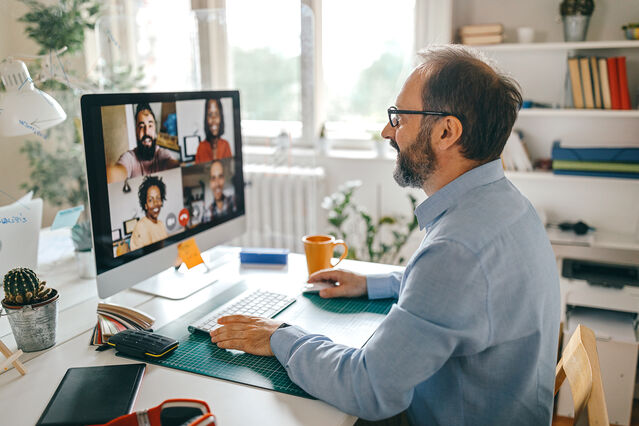Anxiety
Working From Home, Twice
My experience in working from home at two points in my practice.
Posted April 28, 2021 Reviewed by Jessica Schrader

The COVID-19 crisis that began in March 2020 disrupted everyone and everything, and therapists were no exception. Within a day, we left our offices, went home to quarantine, and had to figure out how to contact and help our clients. Like everyone else, I adjusted: I arranged to see my patients on my iPad in my home office. This was the second time I worked from home. The first was half a century ago.
First Home Office
When I finished my Public Health Service obligation in the 1960s, it was time to start a private psychiatric practice. With three very young sons and a wife, I thought I was being clever when I bought an inexpensive tract house with five bedrooms; three for the boys, a master bedroom, and a home office. On paper, it looked perfect.
The living quarters and four bedrooms were on the upper level of the split ranch. Below at ground level were my office, a family room/waiting room, a bathroom, and the garage. The separate entrance from the driveway would, I thought, ensure privacy. It looked like a perfect setup. Ha!
As soon as we moved in, we discovered that inexpensive also meant cheap. Below are some key examples.
Heating and air-conditioning were accomplished using a system of ductwork that connected all rooms of the house with the furnace and air-conditioning unit. The ducts had a second function; they conducted sound from every room to every other room. Anything said anywhere could be heard everywhere. A crying child always woke a brother. The three of them formed a relay team whose crying kept everyone awake through much of the night.
Sound transmission was augmented by the paper-thin plasterboard walls, which only muted conversations in the next rooms. Also, my 3-year-old thought he was a superhero when he punched holes in the walls of his room.
Then there was the floor. During the day the boys, running back and forth on the thinly carpeted floor, sounded like a herd of ponies as I sat below in my office. It was a bit like doing therapy in the New York City subway.
Then things got bad.
A depressed client and I were in my office. He was talking about how he felt whenever his wife threatened suicide. We were in the middle of the session, and he was on the verge of tears, when a body crashed to the floor above us. A split second later we heard a woman screaming “STOP! STOP! STOP!” We heard bodies rolling around on the floor above, wrestling, struggling.
Before I could speak, my patient beat me to it. He grabbed his coat, ran out the door, and was gone. A half-second later, I was bounding up the stairs.
The air was yellow with canary feathers. The bird cage usually sat on a three-legged round table by the window, but no longer. Albert, our black cat, had jumped up on the table to get Missy, the canary. He’d gotten his paw through the cage wires but could not get free. In panic, he had knocked the cage and table to the floor, and they were rolling around. My wife was screaming at the cat to stop. The newly naked bird was flying about its cage in a panic.
It was a classic case of The Cat and the Canary!
The next day I rented an office.
Second Home Office
This is being written at the end of April 2021 from my home office. I gave up my professional office 13 months ago, on orders from COVID-19. Probably innumerable therapists are deciding, now or in the next few months, whether to continue working at home or return to a professional office. I thought it would be interesting to summarize the verdict of a group of colleagues who are facing this decision.
We call ourselves ‘The Soup Group,’ seven colleagues working as solo psychotherapists who have been meeting once a month for the past 20 years, providing peer supervision and support. We suspended our meetings in March 2020 and are working on a plan to resume meeting in May. In the course of our conversations about getting together again, I asked each member about plans for the future of their practice. All but one of us have been vaccinated against COVID-19.
Some of us found working on screen at home to have an unexpected benefit. Once you have developed an on-screen relationship with your clients, you can continue working from anywhere. One has continued seeing clients while taking an extended vacation with family on the opposite coast. Another rented a cottage for the summer on Cape Cod, where he and his wife will continue the practice.
Fred (not his real name) hosted the Soup Group in his large, comfortable office until last March. He still has the office but has not returned to it … yet. Fred is a social worker whose practice is focused on adolescents and adults with addictive problems. He has been working more than full-time for the past year out of his home office, using his computer to speak with most of his clients. A few prefer the telephone.
Sally is a social worker who has been continuing her practice at home via telephone. She uses a computer for other things but did not feel comfortable seeing and being seen by clients on screen. She still has her professional office, which she likes very much, but has not yet decided whether to return.
Ellen is a social worker who specializes in the treatment of patients with eating disorders. She has continued working in her professional office, which is a wing of her home with a separate entrance. Like others in the group, her practice has grown in the past year, as COVID has caused relapses and brought new clients to treatment.
Audrey is a psychologist who gave up her office a year ago; she has been seeing more clients than ever on her computer screen. After recently looking into renting an office, she will probably just continue working from home.
Helen is a social worker who, working on her computer this past year, has seen her practice grow. She intends to return to her professional office very soon.
Frances is a psychiatrist who had returned to her professional office by the time I spoke with her in early April. Her office building was sold several months ago and she lost the office she had practiced in for 20 years. Undeterred, she promptly rented a new office and invited us to meet there.
Finally, what about Bert? I have an easy decision. As the oldest member of the group, I am close to retirement. For me, renting an office for the umpteenth time makes no sense. I will stay at home on my iPad for a bit longer. Soon I will retire from my psychiatric practice to focus on my new career as a writer.
What is the takeaway? COVID has been a disaster that killed millions, and continues to kill. It has forced every government and person to reevaluate health and sanitation practices. It has disrupted the economy of each country and destroyed the economies of some nations. Yet there are some upsides too. Medical and vaccine research responded to the challenge with major advances that are already changing other areas of medicine.
The task facing each of us is to stay safe as we reorganize our lives around unforeseen threats and opportunities.




